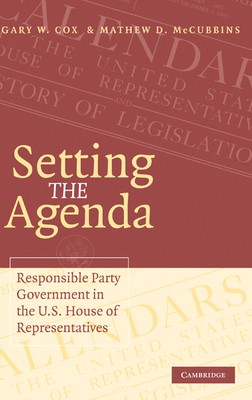
- We will send in 10–14 business days.
- Author: Gary W Cox
- Publisher: Cambridge University Press
- Year: 2005
- Pages: 352
- ISBN-10: 0521853796
- ISBN-13: 9780521853798
- Format: 16.1 x 24.4 x 2.4 cm, hardcover
- Language: English
- SAVE -10% with code: EXTRA
Reviews
Description
Scholars of the U.S. House disagree over the importance of political parties in organizing the legislative process. On the one hand, non-partisan theories stress how congressional organization serves members' non-partisan goals. On the other hand, partisan theories argue that the House is organized to serve the collective interests of the majority party. This book advances a partisan theory and presents a series of empirical tests of that theory's predictions (pitted against others). The evidence demonstrates that the majority party seizes agenda control at nearly every stage of the legislative process in order to prevent bills that the party dislikes from reaching the floor.
EXTRA 10 % discount with code: EXTRA
The promotion ends in 16d.18:55:04
The discount code is valid when purchasing from 10 €. Discounts do not stack.
- Author: Gary W Cox
- Publisher: Cambridge University Press
- Year: 2005
- Pages: 352
- ISBN-10: 0521853796
- ISBN-13: 9780521853798
- Format: 16.1 x 24.4 x 2.4 cm, hardcover
- Language: English English
Scholars of the U.S. House disagree over the importance of political parties in organizing the legislative process. On the one hand, non-partisan theories stress how congressional organization serves members' non-partisan goals. On the other hand, partisan theories argue that the House is organized to serve the collective interests of the majority party. This book advances a partisan theory and presents a series of empirical tests of that theory's predictions (pitted against others). The evidence demonstrates that the majority party seizes agenda control at nearly every stage of the legislative process in order to prevent bills that the party dislikes from reaching the floor.


Reviews